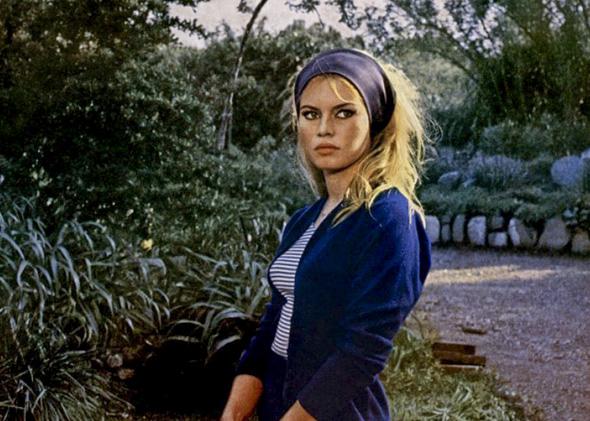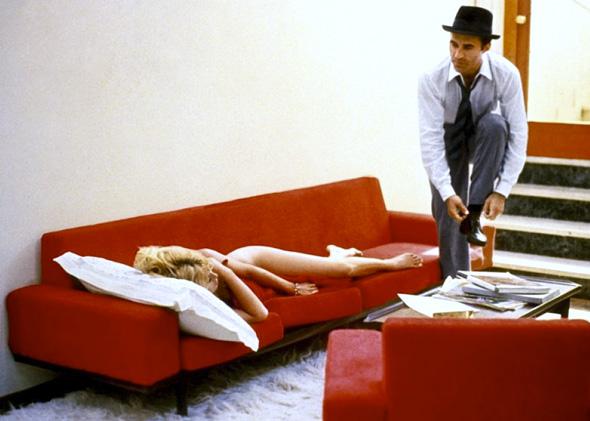For a nuanced critical consideration of Jean-Luc Godard’s Contempt, see the Phillip Lopate essay in which he describes the director striking “his deepest human chords” therein. For a view that reads this adaptation of an Alberto Moravia novel in the context of its production and the director’s career, see Richard Brody’s book Everything Is Cinema. For kicks, contemplate its substance—its story of a writer (Michel Piccoli) whoring out himself and perhaps his wife (Brigitte Bardot) to a wolfish movie producer (Jack Palance)—as a superlative statement of hep ethics and aesthetics. For your consideration: Contempt—released as Le Mepris in Godard’s France and Il Disprezzo in Moravia’s Italy, where it debuted to the world 50 years ago this week—ranks as the coolest movie of all time.
Is this point debatable? Mais oui. There are several cases to be made that it is not even the coolest movie made in France in the 1960s. You could put in a word for Jules et Jim, but I would observe that François Truffaut’s sentimentalism is a softer and squishier thing than Godard’s brilliant cynicism; Contempt’s alienated hero somehow makes alienation itself look heroic. Or you might nominate Last Year at Marienbad instead, in which case I’ll say that you’re privileging obscurantist avant-garde chic over the clarity and classicism of a film about a film remake of the Odyssey. If you were to argue that Le Samouraï, Jean-Pierre Melville’s lean-bodied hit-man procedural, beats Contempt for surface tension and deep sangfroid, I would say you might have a point there. And yet you would concede that Godard’s early features constitute film’s greatest sustained achievement in attractive detachment, raffish charisma, and photographing bangs.

Courtesy of Lions Gate Home Entertainment
Inventing the jump cut, choreographing the Madison, costuming Eddie Constantine in a trench coat—these are obvious in their coolness, but obviousness is not cool (obviously). Contempt’s comparatively nonchalant attitude toward innovation—the relative subtlety of its freshness—thus earns special distinction. A typical Godard film of that period, only averagely supercool, would situate Anna Karina as an understated sex symbol in a brashly just-ahead-of-the-moment scenario. Here, compelled by his producers to exploit the form of unsubtle Bardot, he anatomizes her curves and analyzes our gaze, eating his cheesecake and having it too. Contempt is the most conventional film of Godard’s New Wave period and the least overt in its poses—except when Piccoli, putting his thinking cap on, very literally poses as Dean Martin in Some Came Running, a bit of mimicry figuring in a grand scheme of movie love and the unforced analysis of it.
Which brings us to Fritz Lang, who plays himself as the director of the film within the film. Both Samuel Fuller and Woody Allen will tell you that Godard is a great director of directors, and from Lang he here elicits some weathered drolleries, a spirit of calm control, and the easy dignity of old grandeur. In a recent piece on Contempt, Brody mentioned Lang’s pinstriped suit in connection with the idea that the charm of Godard’s own personal style manifests in his characters’ “reserved expressiveness”—“a steadiness that is non-theatrical but in no way natural.” That is one definition of cool, and Lang’s sense of self-possession is another.
Piccoli’s hero is moving in pursuit of this quality. He also wants money and integrity and renown, but to look at him looking at Lang is to know that the old man’s crisp serenity of style is the grand prize. He won’t win it, however, no matter how much he fusses with his hat, and we might see why by extending a Godard remark about film into the spiritual dimension. “To me,” the director once said, “style is just the outside of content, and content the inside of style, like the outside and the inside of the human body.” This is the transcendental school of cool, and Contempt is its central text.
